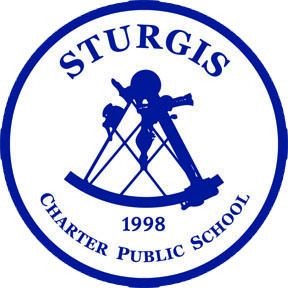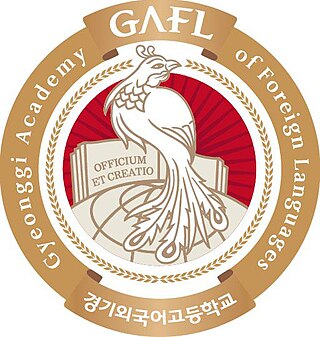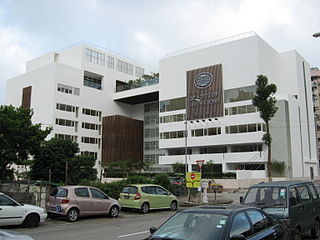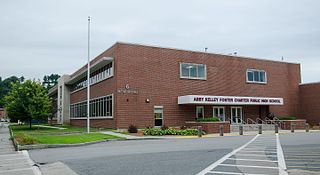
The Sturgis Charter Public School is a dual-campus charter school located in the village of Hyannis, Massachusetts, United States. The school received its charter in February 1998 and opened in September for the 1998–1999 academic year with 162 freshman, 15 faculty and staff, a newly renovated facility, and a $1.2 million budget. The school philosophy is International Baccalaureate for all students.

Copenhagen International School (CIS) is an international, co-educational day school located in the Copenhagen metropolitan area, Denmark. It has around 930 students of over 80 nationalities. English is the primary language of instruction. CIS offers an educational program from pre-kindergarten through grade 12 for students of all nationalities. The school year comprises four quarters, from mid-August through mid-June. Copenhagen International School is designed by C.F. Møller Architects.
The International Baccalaureate Diploma Programme (IBDP) is a two-year educational programme primarily aimed at 16-to-19-year-olds in 140 countries around the world. The programme provides an internationally accepted qualification for entry into higher education and is recognized by many universities worldwide. It was developed in the early-to-mid-1960s in Geneva, Switzerland, by a group of international educators. After a six-year pilot programme that ended in 1975, a bilingual diploma was established.
The Group 1: Studies in language and literature subjects of the IB Diploma Programme refer to the student's first language. Three courses are available: Language A: literature, Language A: language and literature and an interdisciplinary subject, Literature and performance. Students who complete two group 1 subjects, or complete a group 3 or 4 subject that is of a different language of the group 1 subject taken by the candidate, are eligible to be awarded a bilingual IB Diploma on the condition that the candidate obtains a level 3 or greater in both subjects.
The Group 2: Language acquisition subjects of the IB Diploma Programme consist of the nearly 80 additional languages offered and may be studied at the following levels: B, or ab initio. Latin and Classical Greek are also offered and may be taken at SL or HL. To earn an IB Diploma, a candidate must study an additional language, though a second Language A may be taken instead of studying that language as a Group 2 subject.
Luther College is a university college and high school located in Regina, Saskatchewan, Canada. The university campus of Luther College is located on the campus of the University of Regina and serves as a federated college of the university. The high school is located at 1500 Royal Street. There are approximately 2600 students and 1115 full-time employees at the university campus. As a federated college, Luther College is administratively and financially independent, but Luther students may earn a University of Regina degree and can take courses at the University of Regina.

Vienna International School (VIS) is a non-profit international school in Vienna, Austria. The school was built to accommodate the children of United Nations (UN) employees and diplomats when the UN decided to locate one of its offices in Vienna, and it remains affiliated to the UN. About 50% of students are children of UN employees and receive education grants, while much of the remaining students are children mainly of embassy staff and company staff. The school has an enrollment of 1400 students, from pre-primary to twelfth grade.

The Toronto French School (TFS), founded in 1962, is an independent, bilingual, co-educational, non-denominational school in Toronto, Ontario, Canada. Charles III, as King of Canada, is the royal patron of the school. The school rebranded in 2011 to become TFS – Canada's International School.

Gyeonggi Academy of Foreign Languages, or GAFL is a foreign language high school located in Uiwang-si, Gyeonggi-do, Korea. It is equipped with two student dormitories, each for different genders, with its own dormitory inspectors as staff. Students are divided into eight classes per grade by language in which they would like to major. It was originally established under the name of Myongji Foreign Language High School on March 2, 2004, by Myongji Foundation. It was run as Myongji Foreign Language High School for 5 years, but due to declining financial situation of Myongji Foundation, the school was taken over by Bong-ahm Institute in 2008. Consequently, Bong-ahm Institute changed the name of the school to the current name of Gyeonggi Academy of Foreign Languages, with changes in various areas, including the principal, school uniform, dormitory inspectors and operation of school cafeteria. Although it kept the original subjects, or "majors", GAFL's international department changed the curriculum of its international curriculum department to International Baccalaureate Diploma Programme in 2011, making GAFL the first Korean high school to adopt the program. Currently, there are nine years worth of graduates, with alumni spread over diverse universities, including domestically prominent SKY (universities) and various universities abroad. The school is also well known for its high tuition fee, always being in the top 10 schools by tuition fee.

The American International School – Riyadh (AIS-R) (previously known as American Preparatory School of Riyadh, RICS and SAIS-R is an independent, non-profit, K-12, coeducational day school following an American-based curriculum with a focus on international perspectives. The IB Diploma Program is also offered in the high school. The school was established in 1963 and is located in the kingdom's capital, Riyadh.

The International School of Beaverton (ISB) is an option school that serves grades 6-12 in the Beaverton School District. It is the only school in the district to be a full International Baccalaureate (IB) school, where all students take IB courses and complete additional work for the Middle Years Programme (MYP) and the Diploma Programme (DP), including the personal project and the extended essay. In 2012 and various other years, U.S. News & World Report ranked the school as the best public high school in the state, and 20th in the nation. The current principal is Andrew Gilford and the assistant principal is Kelly Bordwell.

St. Gilgen International School (StGIS) co-educational boarding and day school between the ages of 9 and 18. The school offers a primary and middle school curriculum leading to the highly regarded International Baccalaureate Diploma Programme qualification in the final two years. The language of instruction is English.

The Anglo-American School in Sofia (AAS) is a private school founded in 1967 in Sofia, Bulgaria under the sponsorship of the American and British embassies.

The School of the Nations is a Baháʼí-inspired school located in Taipa, Macau,owned by the Badi Foundation.

Abby Kelley Foster Charter Public School is a K–12 school located at 10 New Bond St., Worcester, Massachusetts, United States in former Heald Machine Company buildings. The school was founded in 1998.

Tikkurila Upper Secondary School, abbreviated in Finnish as TILU, is the largest high school in Finland, with about 1200 students from years 10 to 12. The school also offer an IB programme which is greatly valued in all around the world. The school is located in Tikkurila, Vantaa, and is approximately 430 metres (1,411 ft) from Hiekkaharju's station. In 2018, junior high school graduates needed a minimum of 8.10 GPA to be admitted to study at Tikkurila Upper Secondary.
Green Land International Schools is a private international school and nursery located in Giza Governorate, Egypt.
A high school diploma is a diploma awarded upon graduation of high school. A high school diploma is awarded after completion of courses of studies lasting four years, typically from grade 9 to grade 12. It is the school leaving qualification in the United States and Canada.

Ritsumeikan Uji Junior and Senior High School (立命館宇治中学校・高等学校) is a private school located in the city of Uji south of Kyoto, Japan. The high school opened in 1994 and the middle school opened in 2003. It is currently one of four junior and senior high schools affiliated with Ritsumeikan University. The Ritsumeikan family of schools also includes Ritsumeikan Asia Pacific University, located in Beppu, and Ritsumeikan Primary School, located in north Kyoto.

The State International School Seeheim, also called SISS is the international branch of the Schuldorf Bergstraße. It is made up of a primary and a secondary branch as well as a pre-school. The school represents a pilot project in Germany - a public school where the language of instruction is primarily English. The school is a community of people from different parts of the world and has strived to be internationally profound. The school has been architecturally designed to look like an irregular pentagon when viewed from above. This is the only state funded international school in Germany, and one of 3 international schools in Germany that offer the IB Diploma Program. The Primary department is designed to prepare students for the International General Certificate of Secondary Education (IGCSE).

















